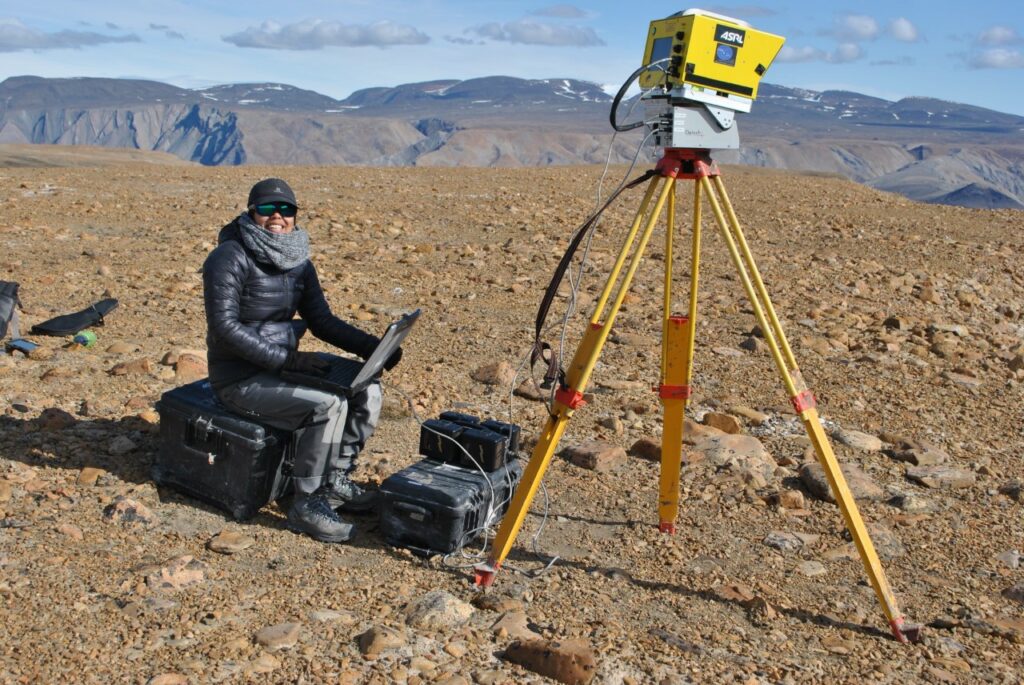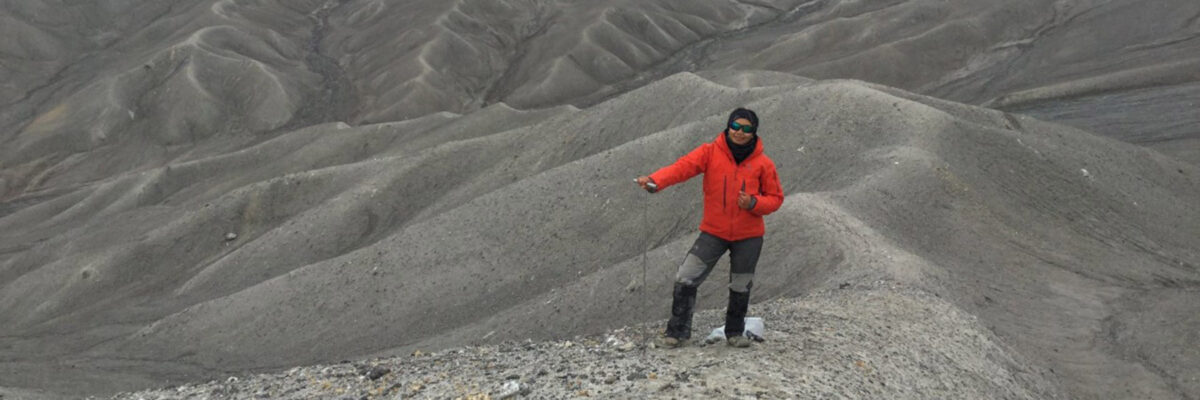PhD student Chimira Andres named recipient of the 2022 Eiffel Excellence Scholarship Program
Tags:

This story originally appeared in YFile.

Chimira Andres was awarded a doctorate scholarship for her work on investigating ice on the red planet and how space glaciers “flow” on Mars. Andres is interested in the dynamics and relationships of the cryosphere and the potential water-ice cycle on Mars by looking at glacial and periglacial (permafrost) landscapes in regions on Mars’ north/south poles and mid-latitudes. By looking at the movement of ice using techniques such as ground-penetrating radar (GPR), light detection and ranging (LiDAR), and radar remote sensing in the Canadian High Arctic, these cold, high alpine environments on Earth can be used as a basis of comparison (planetary analogues) to cold environments on Mars.
The scholarship is provided through Campus France, and Andres will be working with the Cotutelle Program for one year. Her first visit will take place from September 2022 to February 2023 and again from September 2023 to February 2024, where she will be collaborating with l’Université de Nantes in the Laboratory of Planetology and Geodynamics (LPG) under the co-supervision of Susan Conway.
“My main motivation for applying to the Cotutelle Program is to have the opportunity to build and gain experience by participating in the ExoMars Colour and Stereo Surface Imaging System (CaSSIS) mission planning, enhancing my knowledge in planetary remote sensing techniques, utilizing LPG’s virtual reality suite (with updated DTM-derived data of Mars/Earth study regions), and participating in future cryosphere-related field campaigns in Iceland, Alaska, or Norway led by Dr. Conway,” says Andres.
Andres’ research will help guide the future International Mars Ice Mapper (I-MIM) Mission in collaboration with the Italian Space Agency (ASI), Canadian Space Agency (CSA), Japan Aerospace Exploration Agency (JAXA), and National Aeronautics and Space Administration (NASA). The work aims to answer current questions in polar Mars research and reflect on how this can influence future (human) Mars missions and sustainable human exploration.
This year, the Ministry for Europe and Foreign Affairs allocated 393 scholarships to foreign students to finance their studies in France for the 2022 academic year: 344 for the master’s course and 49 for the doctorate course. Two major disciplinary fields recognized in the program include science and technology and humanities and social sciences research.

The Eiffel Scholarship Program helps to train future foreign decision-makers, from the private and public sectors, in priority fields of study, and stimulate applications from students from emerging countries for the master’s level and from emerging and industrialized countries for the doctoral level.
Students participating in the Cotutelle Program will be fully integrated into the LPG. As a member of the theme “Planets and Moons” which is in close collaboration with the theme “Planet Earth,” students will study the surface and interior of Mars, Mercury, icy satellites and more. The research skills of this lab range from the surface to internal dynamics, including geomorphology, petrology, seismology and numerical and theoretical modelling. It will include access to weekly seminars and opportunities for collaboration with internationally renowned researchers from the laboratory and their collaborators, including those on current and future space missions.
“We’re really happy that Chimira has received this scholarship. It fulfils part of her professional and personal goals of completing a PhD partially in Canada and partially in France,” says Isaac B. Smith, assistant professor in Lassonde’s Department of Earth & Space Science & Engineering and Planetary Science and Canada Research Chair. “Susan Conway is an expert on terrestrial cryosphere field observations and on using remote sensing to study the cryosphere of Mars. Her work and mine closely align, and so having us both mentor Chimira will broaden the research project while offering different styles of mentoring.”
Together with Conway, Andres will play an active role in the management and implementation of her thesis and the dissemination of her results. Their research will use a combination of orbital radar and image data to characterize the geomorphology of ice-related landforms.
“Mars is a permafrost world where water ice is abundant at, near, and under the surface. Radar studies performed to date have substantiated the existence of shallow ground ice and have confirmed the existence of debris-covered glaciers on Mars of which my advisor at York University (Dr. Isaac Smith) has participated in numerous studies as the radar lead,” says Andres. “This will help build on my research at York University focusing on radar remote sensing while adding further knowledge on icy, planetary geomorphology on Mars… I hope to generate a full geomorphologic map of the Phlegra Montes region on Mars, a future candidate human landing site, to help guide further research into icy geomorphology and past climate on Mars.”
To learn more about the scholarship program, visit the Campus France website.